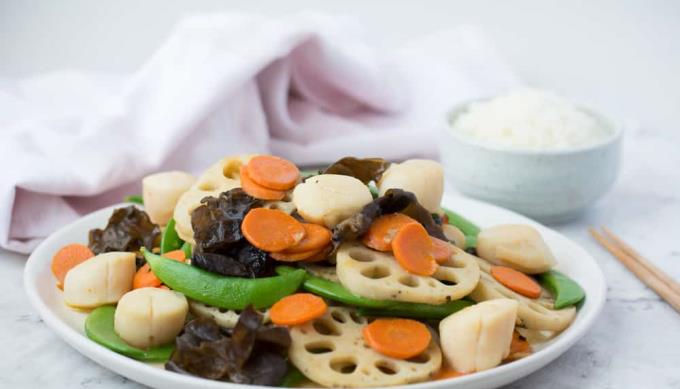A perfect diet is indispensable for the contribution of fruits and vegetables. Therefore, it is very important to choose vegetables that are good for pregnant women to have a balanced diet that ensures both nutritional needs and good health.
During pregnancy, your body needs to be replenished with nutrients, vitamins and minerals. During the second and third trimesters, each pregnant woman needs about 350-500 more calories / day. If your diet does not ensure enough nutritional needs, it can negatively affect the development of the fetus such as having problems with the neural tube , being born underweight ...
Poor eating habits, strict diets, or overeating, leading to excessive weight gain can also increase the risk of gestational diabetes, more susceptible to complications during pregnancy or childbirth. Simply put, eating healthy, nutritious foods will help ensure the health of you and your baby throughout your pregnancy. In addition, this also makes it easier to lose weight after giving birth .
In this article, aFamilyToday Health will answer the questions that pregnant women should eat or what vegetables are good for pregnant women so that you can choose the most appropriate, nutritious choice without worrying about gaining too much weight from your diet. .
Essential minerals in pregnancy
The reason why pregnant women should eat a variety of vegetables is to provide the body with all the essential nutrients in this food group. A diverse diet of colorful vegetables is ideal for pregnant women. Note that the amount of fruits and vegetables pregnant women should eat is about 400g / day. This not only supports pregnant mothers to avoid constipation during pregnancy but also helps to reduce the risk of dangerous diseases such as heart disease, gestational diabetes, obesity, stroke ...
Want to know which vegetables are good for pregnant women, you should briefly learn about the essential nutrients that pregnant mothers need. Here are the essential nutrients for pregnancy, you can get from vegetables and roots:
Calcium: This mineral is essential for the formation of fetal skeletal system and strengthens bones for pregnant mothers, helping the fetus develop comprehensively.
Beta-carotene: Essential for fetal cell, tissue, vision and immune system development.
Vitamin C: Play a role in enhancing the body's absorption of calcium, helping to form healthy bones and teeth.
Potassium: This mineral has a role in helping to regulate blood pressure.
Folic acid: Helps reduce the risk of neural tube defects in the fetus and helps prevent low birth weight.
Fiber: Helps digest food well and reduces constipation during pregnancy .
Vegetables are good for pregnant women to have a healthy pregnancy
Pregnant women should eat a variety of vegetables so that the body has the essential nutrients. The vegetables you should eat include leafy vegetables, flowers and bulbs. aFamilyToday Health recommends the following typical vegetables:
Leafy vegetables, flowers

With the vegetables in this group, pregnant mothers should prioritize the selection of vegetables with dark green or colorful colors such as broccoli, artichokes, olives, watercress, spinach ( spinach sticky rice ), cheeks, water spinach, choysum, rainbow greens, celery, spinach, jute, amaranth, sweet spinach ... contain many nutrients that are good for pregnant women.
These vegetables are a complete source of calcium, iron, potassium, folate, fiber and vitamins A, C, and K ... Due to their high fiber content, they are effective in preventing constipation during pregnancy. .
In addition, dark green vegetables such as broccoli, watercress lettuce, spinach, artichoke flower ... are rich in antioxidants, containing plant compounds that are beneficial for the immune system and digestive system. .
1. Artichoke
Artichokes are rich in choline, folate, magnesium, fiber, low in fat and cholesterol to help protect the fetus against the risk of neural tube defects, prevent low birth weight babies, reduce constipation during pregnancy , and reduce cramps. and restlessness during pregnancy.
2. Vegetables need
Vegetables need to contain a lot of nutrients such as carotene, nicotinic acid, vitamins B, C, calcium, phosphorus, iron, rich in fiber ... These substances have effect on heat, blood cooling, diuretics, sedation and blood reduction. pressure ...
According to Oriental medicine, vegetables need water also have effects such as cough reduction, anti-inflammatory, expectorant, lowering blood pressure, antifungal, reducing sugar, blood fat ... As a vegetable rich in fiber, vegetables need to act as a The broom effectively "sweeps" all waste out of the digestive system. In addition, the aroma of vegetables should also be used to stimulate the sweat glands, reduce blood pressure.
3. Spinach
Spinach is a leafy vegetable rich in minerals such as potassium, zinc, magnesium, iron, calcium ... and vitamins such as folate, niacin, vitamin A, vitamin B6, vitamin C, vitamin K, vitamin B1 (thiamine), vitamin B2 (riboflavin) and many other essential vitamins. This is a very healthy vegetable with a low fat content. Pregnant women can be used to cook stir-fry dishes or to cook soup, to fry eggs ...
According to the US Department of Agriculture (USDA) , 100g of spinach contains 28.1µg of vitamin C, meeting 34% of the recommended daily requirement of this vitamin.
Spinach has many uses: managing diabetes, preventing cancer, helping to form strong bones, supporting digestion, preventing macular degeneration, preventing cataracts, helping the system. healthy development of fetal nerve ...
4. Cabbage
Cabbage is a rich source of vitamins A, E, K, magnesium, zinc ... very good for the healthy development of the fetus.
Note that with vegetables grown under water such as celery, water spinach, spinach, watercress ... are easy to infect. Therefore, when preparing, you should wash several times under running water, soak with dilute salt water for about 15 minutes before processing to ensure hygiene. Pregnant women avoid eating these vegetables raw to limit infections that affect the health and fetus.
Vegetables good for pregnant women: Group of vegetables and fruits
Fruits such as tomatoes, bell peppers, melon varieties, squash ... also play a very important role in providing essential minerals and ensuring nutritional needs for pregnant women. Here are some typical vegetables and fruits:
1. Tomatoes
Tomatoes are a fruit and vegetable rich in vitamin C and iron. Pregnant women should regularly add tomatoes to the diet to reduce stress and fight aging. You can use tomatoes to prepare dishes: fish ketchup, tomato egg soup, salad, tomatoes ... or tomato juice or smoothie.
2. Bell peppers

Bell peppers are a rich source of vitamin C. The vitamin C content of bell peppers is three times higher than those of oranges. In addition, this fruit also helps to absorb iron better, helping to reduce the risk of anemia during pregnancy. Dishes such as bell peppers stir-fried with beef, bell peppers stuffed with fish slices ... are very suitable for pregnant women.
3. Green squash
Pumpkin is a very good vegetable for pregnant women in the last trimester. The reason is that at this stage, pregnant women often have leg edema because the lower limb vein is pinched, blood circulation decreases.
According to Oriental medicine, zucchini has welding properties, a sweet taste, a lot of water that can prevent thirst and diuretic. Pumpkin soup cooked with lean meat or carp can help pregnant mothers reduce leg edema during pregnancy .
4. Pumpkin
The nutrients in the leaves, stems, flowers and fruits of the pumpkin plant are all very useful for pregnant women, helping to promote the development of fetal neurons, enhancing activity for brain cells. In addition, vegetables from pumpkin are also used to prevent high blood pressure, reduce leg edema, promote blood clotting, and help limit postpartum bleeding . Therefore, "yes" is the answer to the question of whether pregnant women eat pumpkin well.
You can stir-fry and boil young squash, pumpkin flower with garlic or beef. Pumpkin cooks soup and porridge to benefit the liver and kidneys and restore fitness and appetite for pregnant women.
Root vegetables
1. Sweet potatoes
Sweet potatoes are rich in beta-carotene, a plant compound that turns into vitamin A in the body. Vitamin A is essential for the growth and differentiation of most cells and tissues and is important for the healthy development of the fetus. Pregnant women should get a supplement of vitamin A for their body. However, it is important to avoid supplementing vitamins of animal origin (liver, red meat, eggs ...), because it can cause poisoning if you add too much. Therefore, foods rich in beta-carotene like sweet potatoes are an excellent source of vitamin A and are safe for pregnant women. In addition, potatoes are a fiber-rich food that improves digestive health.
2. Lotus root

Lotus root has a sweet taste, is considered a low calorie food source, rich in fiber, high in vitamins and minerals. This root vegetable has uses such as: digestive aid, sedative, blood circulation, blood pressure balance ...
In addition, other parts of the lotus plant such as lotus, lotus seeds ... are also nutritious food sources. You can use lotus root to process dishes such as lotus root soup with young ribs, lotus root soup with shrimp, lotus root tea with green beans, lotus root salad ... With lotus, you can use lotus leaf salad. . Lotus seeds are used as ingredients in the stew: evil chicken stewed with lotus seeds, stewed pigeons with lotus seeds, sticky rice with lotus seeds, tea with lotus seeds ...
3. Carrots
Carrot is a tuber rich in vitamin A, beta-carotene, poly-acetylene falcarinol and vitamins such as A, K, C, and B6 ... very good for the health of pregnant women. Carrots help strengthen eyesight, immune system, and keep skin healthy. Therefore, this root vegetable is an "indispensable member" in the list of vegetables pregnant women should eat.
You should cook carrots so that your body can absorb more beta-carotene than eating raw or drinking carrot juice .
Vegetables good for pregnant women: Do not skip nuts
In addition to the vegetables that are good for pregnant women above, you should eat more of the following nuts for the body to have all the necessary nutrients for pregnancy.
1. Green beans
Green beans are rich in protein and vitamin K, which help keep bones strong and healthy. Green beans also contain many plant proteins, helping pregnant women reduce fatigue during pregnancy .
2. Other beans
Beans such as peas, lentils, black beans, peanuts ... are good for women during pregnancy. They are an ideal source of fiber, protein, iron, folate (vitamin B9), calcium, magnesium, and potassium.
Legumes are a good source of folate, fiber and many other essential nutrients. Folate is a very important nutrient during pregnancy and may reduce the risk of several birth defects and disease.
Hopefully, with the sharing in the article, the pregnant mother has an answer to the question of what vegetables she should eat or what vegetables are good for her. Wish pregnant mom through a healthy pregnancy.














